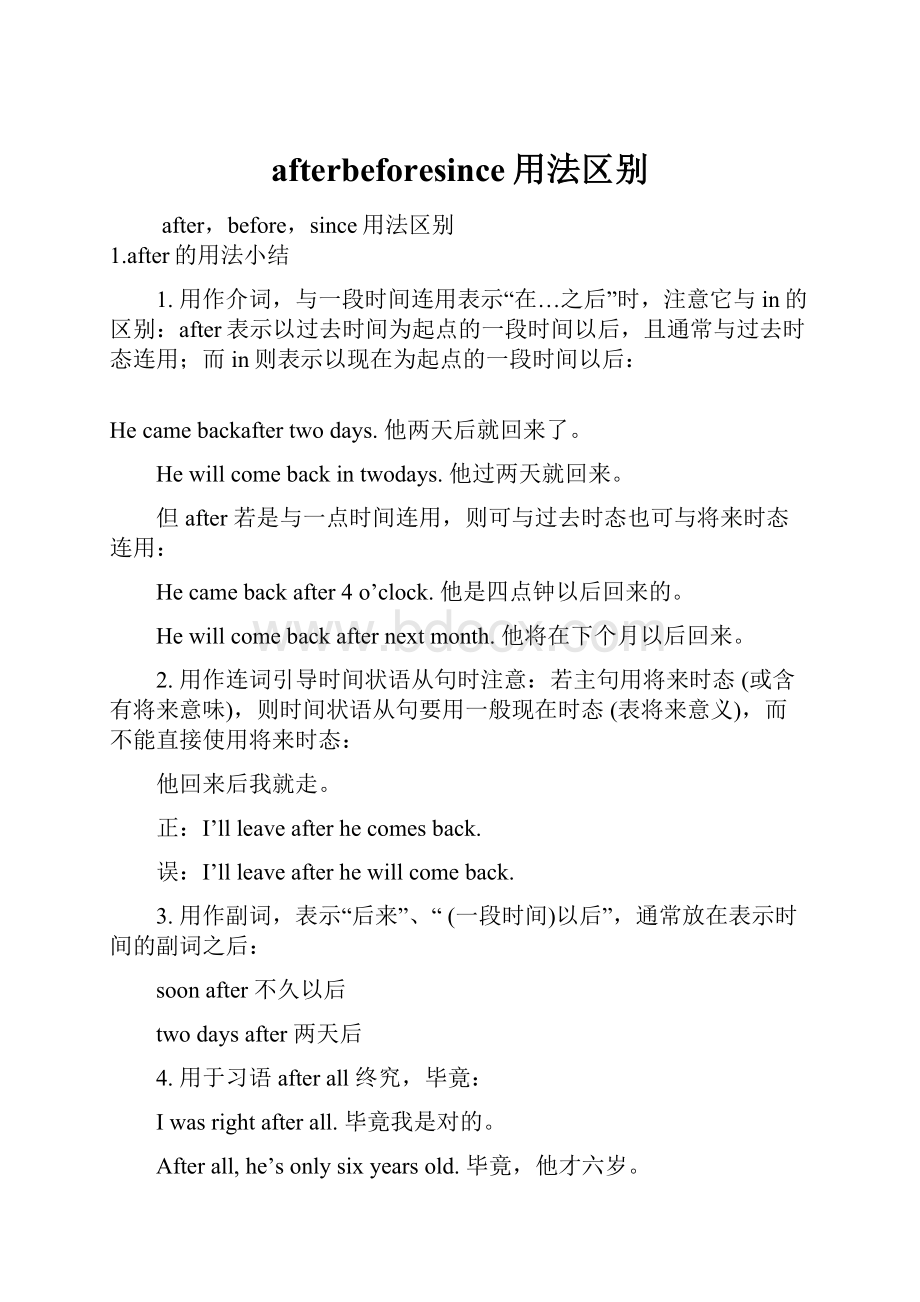afterbeforesince用法区别.docx
《afterbeforesince用法区别.docx》由会员分享,可在线阅读,更多相关《afterbeforesince用法区别.docx(15页珍藏版)》请在冰豆网上搜索。

afterbeforesince用法区别
after,before,since用法区别
1.after的用法小结
1.用作介词,与一段时间连用表示“在…之后”时,注意它与in的区别:
after表示以过去时间为起点的一段时间以后,且通常与过去时态连用;而in则表示以现在为起点的一段时间以后:
Hecamebackaftertwodays.他两天后就回来了。
Hewillcomebackintwodays.他过两天就回来。
但after若是与一点时间连用,则可与过去时态也可与将来时态连用:
Hecamebackafter4o’clock.他是四点钟以后回来的。
Hewillcomebackafternextmonth.他将在下个月以后回来。
2.用作连词引导时间状语从句时注意:
若主句用将来时态(或含有将来意味),则时间状语从句要用一般现在时态(表将来意义),而不能直接使用将来时态:
他回来后我就走。
正:
I’llleaveafterhecomesback.
误:
I’llleaveafterhewillcomeback.
3.用作副词,表示“后来”、“(一段时间)以后”,通常放在表示时间的副词之后:
soonafter不久以后
twodaysafter两天后
4.用于习语afterall终究,毕竟:
Iwasrightafterall.毕竟我是对的。
Afterall,he’sonlysixyearsold.毕竟,他才六岁。
2.Before的用法小结
高三课本第十五单元,INTERGATINGSKILLS和WORKBOOKREADING部分有如下的句子:
⒈Theshopwassuccessful,butitwasaboutsixtyyearsbeforepeoplestartedtobuyjeansforfashionaswellasforwork.
⒉However,itprobablywillnotbelongbeforetheothermountainousareasofChinasuchasSichuan,XinjiangandYunnanaredeveloped,andasmorefacilitiesbecomeavailable,priceswillalmostcertainlyfall.
其中涉及到before的用法,下面就其用法进行总结。
一、可以用作介词
⒈)指时间上早于,在……之前,如:
Shehaslivedheresincebeforethewar.
她从战前就一直在这儿住。
⒉)指位置在前面,如:
WekneltdownbeforeGrandma‘sgrave.
我们在奶奶的墓前跪下。
⒊)指顺序或排列在之前,如:
Yournamecomesbeforemineonthelist.
名单上你的名字在我之前。
⒋)在某人面前,如:
Shesaiditbeforethewitness.
他是当着证人的面说的。
二、作为连词
其基本含义是“在……之前”,又可以根据不同语境灵活翻译成“才”、“还没来得及就……”、“趁……”、“就”等。
具体用法如下:
⒈)与情态动词can/could连用
这时候从句虽为肯定形式,根据汉语表达习惯译成“还没来得及就”,如:
BeforeIcouldgetinaword,hehadmeasuredme.
我还没来得及插话他就为我量好了尺寸。
Beforeshecouldmove,sheheardaloudnoise,whichgrewtoaterribleroar.
她还没来得及迈步,就听见一声巨响,接着就是可怕的隆隆轰鸣。
⒉)用于肯定句中强调主句所表达的时间,距离长,或花费的精力大,译成“才”
Wehadsailedfourdaysandfournightsbeforewesawlands.
我们航行了四天四夜才看到陆地。
Wewaitedalongtimebeforethetrainarrived.
我们等了很长时间火车才到。
⒊)用于否定句中,强调主句所表达的时间,距离短,或花费的精力小,译成“不到……就”如:
Wehadn‘trunamilebeforehefelttired.
我们跑了还不到一英里他就累了。
⒋)主句含有hardly,scarcely等半否定副词时可以译为“刚……就”
这时候主句应用过去完成时态,从句用过去时,还可以用when替代before如:
Wehadscarcelyreachedtheschoolbefore/whenthebellrang.
我们刚到学校铃声就响了。
⒌)有时还有“宁愿”的意思
I‘dshootmyselfbeforeIapologizedtohim.我宁死也不向他道歉。
⒍)用于It+be/take+时间段+before句型
在这一句型中又可以根据主从句的时态分成两种情况。
若主句是一般时将来时态,从句是一般现在时.若主句是肯定句意思是“要过多长时间才”;若主句是否定形式翻译成“用不了多久就”。
Itwillbetwoweeksbeforeeverythingreturnstonormal.
两周之后一切才能恢复正常。
Itwillbemanyyearsbeforethesituationimproves.
这种状况或许要过许多年才能得以改善。
Itwon‘tbelongbeforewemeetagain.用不了多久我们就会再见面的。
这时若主句是一般过去时从句也是一般过去时。
若主句是肯定句翻译成“多长时间之后才”,若主句是否定形式翻译成“没过多久就”。
如:
ItwassometimebeforeIrealizedthetruth.
过了很长一段时间我才了解到真相。
Itwasn‘tlongbeforeshebecameabravesolider.
没过多久她就成了一名勇敢的战士。
Afterthatitstilltooksevenyearsbeforetheygotmarried.
他们又过了七年才结婚。
注意:
当主句的谓语动词为延续性动词时,before与until有时可以互换。
Itwasanhourbefore/untilthepolicearrived.
■巩固练习
⒈(2004天津)Itwasevening________wereachedthelittletownofWinchester.
AthatB.untilC.sinceD.before
2.(2004全国)Severalweekshadgoneby________realizedthepaintingwasmissing.
A.asB.beforeC.sinceD.when
3.(2005广东)TheAmericaCivilWarlastedfouryears______theNorthwonintheend.
A.afterB.beforeC.whenD.then
4.(2005山东)Itwassometime_______werealizedthetruth.
A.whenB.untilC.sinceD.before
5.(2006四川)-Whydidn‘tyoutellhimaboutthemeeting?
-Herushedoutoftheclassroom_______Icouldsayaword.
A.beforeB.untilC.whenD.after
6.(2006福建)-Howlongdoyouthinkitwillbe__chinasendsamannedspaceshiptothemoon?
-Perhapstwoorthreeyears.
AwhenB.untilC.thatD.before
参考答案:
DBBDAD
3.Since用法
一.时态、现在完成进行时态或过去完成时态连用。
例如:
1、Heleftthevillagein1982andIhaven’tseenhimsincethen.1982年他离开这个村子,从那以后我再没见过他。
2、She’sbeenworkinginabanksinceleavingschool.她中学毕业后就一直在一家银行工作。
3.Hehadspokentoheronlyoncesincetheparty.自从那次聚会以来,他只跟她说过一次话。
二.Since作为副词,表示从过去以来、以后或到现在的情形或状态,常与现在完成时态连用。
例如:
1.Helefthometwoweeksagoandwehaven’theardfromhimsince.他两周前离开了家,到现在我们一直没有他的消息。
2.HecametoZhenjiang6yearsagoandhaslivedhere(ever)since.他6年前来到镇江,从此便住在这里。
三.since引导原因状语从句
作为连词,since可引导原因状语从句,表示因为;既然;鉴于:
例如:
1.Hedidn’tcomesincehewasbusy.他因为忙,所以没有来。
2.Sincethismethoddoesn’twork,let’stryanoter.既然这种方法不行,我们就试用另一种吧。
四.Since在特殊句型中的应用
句型I:
“Itis(hasbeen)+时间+since+持续性动词的过去时”,表示“自从……以来到现在已有多久。
”例如:
IthasbeenquitesometimesinceIwaslastinLondon.我上次离开伦敦至今颇有一段时间了。
句型II:
“Itwas+时间+since+持续性动词的过去完成时”,表示“从……到过去某时间点以来”,例如:
Itwasthreeyearssincewehadbeenhere.那时我们在这已呆了三年。
六.巩固练习
(一)单项选择
1.—Doyousmoke?
—_____.It'stwoyearssinceIsmoked.
A.Yes,IdoB.No,Idon'tC.NottoomuchD.Oh,butIwishIdidn't
2.Sinceyouarebusy,you__________tomorrow.
A.don’tneedcomeB.neednotcomeC.needn’tcomeD.mustn’tcome
3.---Hashebeenhome?
---______,he_________homesincehegraduated.
A.No;hasn'tbeenB.Yes;hasbeenC.No;isn’tD.Yes;is
4.They_________friendssincetheymetinShanghai.
A.haven’tbeenB.havebeenC.aren’tD.are
5.I_______heresinceheleftthedooropen,butitseemsthathewon’tcomebacktoday.
A.havebeenwaitingB.willhavewaitedC.waswaitingD.waited
6.I_________fromhimsincehehaslivedhere.
A.heardB.haveheardC.haveneverheardD.havebeenhearing
7.HecametoChina_______1998.
A.fromB.sinceC.atD.in
8.--Excuseme.DidyounoticewhethertheNo.18bushadgoneby?
--Idon'tknow_Ibegantostandherejustnow.
A.asB.whenC.sinceD.while
现在完成进行时和现在完成时练习
1.—I’msureAndrewwillwinthefirstprizeinthefinal.
—Ithinkso.He________foritformonths.(2008江苏)
A.ispreparingB.waspreparing
C.hadbeenpreparingD.hasbeenpreparing
2.Bythetimeherealizeshe_________intoatrap,it’llbetoolateforhimtodoanythingaboutit.(2008山东)
A.walksB.walkedC.haswalkedD.hadwalked
3.Sofarthisyearwe_______afallinhousepricesbybetween5and10percent.(2008福建)
A.sawB.seeC.hadseenD.haveseen
4.CathyistakingnotesofthegrammaticalrulesinclassatSunshineSchool,whereshe______Englishforayear.(2007湖南)
A.studiesB.studiedC.isstudyingD.hasbeenstudying
5.Danny_________hardforlongtorealizehisdreamandnowheispopular.(2007福建)
A.worksB.isworkingC.hasworkedD.hadworked
BCABACDCDCDDC
farfrom和awayfrom的区别
faraway用作表语或状语,away可以省去,因此,faraway=far;farawayfrom=farfrom
far(away)后不接宾语;far(away)from后一定要接宾语。
Thedonotlivefaraway.
他们住得并不远.
farfrom除了表示距离的”远离”之外,还有”远远不,完全不,决非”之意,后接名词,动名词或形容词.
Farfromreadinghisletter,shedidn'topenit.
别说看他的信了,她连信都没打开.
Heisfarfrom(being)rich.
他一点也不富有.
至于awayfrom与farfrom的区别主要在于far与away的区别:
far是表示较笼统、模糊概念的“远”,而away是表示具体的“远”。
如:
veryfar很远;quitefar相当远;500metersaway500米远;2kilometersaway2公里远
e.g.Myhomeisveryfarfromthehospital.
Myhomeis20kilometersawayfromthehospital.
那如果说远离毒品是不是用farfrom?
应该是说keepawayfrom
farfrom
adv.远离;远非;完全不.
awayfrom
远离,离开;避开痛苦
他们的区别主要是,前者多用于做副词,笼统的远;而后者则多倾向于动词,多指具体的远
①farawayfrom=farfrom意思是离得远
eg:
Itisfar(away)fromhere.它离这里很远。
②awayfrom就是不在某地,表示一种状态。
eg:
Iamawayfromhome.我不在家。
Nanjingisabout305km______ Shanghai.
A.awayto B.awayfrom C. farfrom
该选B还是C?
答:
选B.
分析如下:
1.在farfrom短语中,far是虚指,其前不能有具体的数字。
2.awayfrom前常与具体的数字连用,或与far连用(即farawayfrom),或与具体的动词连用,如:
stayawayfrom,keepawayfrom,...
3.在此句中,farfrom实际上就是farawayfrom省略away而成。
4.当然,farfrom还有“并不,很不,远远不,远非(如此),恰恰相反”等意思,在这时就没有必要理解为farawayfrom的省略形式了。
如:
Buttherealityisfarfromthat. 但事实却远非如此。
Heisfarfromwell. 他并不健康。
Theprojectisfarfromperfect. 这项企划很不完美。
faraway与farfrom的区别
Japanisfar_____ourcountry.
1.away2.from3.in4.to
答案是B,请帮忙分析一下faraway与farfrom的区别,并举个例子说明。
谢了
faraway是远离的意思,farfrom是离``````远的意思。
from是介词。
faraway是形容词,有两个意思:
1)(空间上,时间上)遥远的,久远的;往昔的
2)(表情)迷惘的,恍惚的
而farfrom意思略有变化,带有否定的含义。
有时候相当于notatall(决不),表示一种强烈的不认同,否定,在口语中较多出现。
其常用含义有:
远离;决非;决没有;完全不;不但不...(反而)...,如:
Farfromit!
意思是:
远非如此,差得远呢,一点也不,完全相反等意思。
在本句中用其“远离”之意。
farfrom.
faraway形容词,意思是很远。
farfrom后面跟宾语(名词或介词)
Englandisfaraway.
Yourhouseisfarfrommyhouse.
Yourhouseisfarawayfrommyhouse.
几种说法:
Japanisfarfromourcountry.
Japanisfaraway.
Japanisfarawayfromourcountry.
Japanisfarawayfromourcountry.(注意“faraway”没有断开,是一个形容词,意为遥远的)
以上说法都对,唯有你选A不对,从句子成分上分析吧
farfrom是离某地远
也可以说befarawayfromaway可以用量词代
Over的用法和注意点
一、介词over作“在……上方”、“在……上”(有覆盖、遮蔽之意)解:
1.Thesunshinesovertheearth.
2.Thereisabridgeovertheriver.
3.Theweightoftheairoveronesquarefootoftheearthatsealevelis2160pounds.
4.Acloudhangsoverthesummit.
5.Spreadthetableclothoverthetable.
二、介词over作“超过”、“在……上”解:
1.HehaslivedinBeijingovertwoyears.
2.Itisoverandabovewhatiswanted.
3.Thismethodhasanadvantageoverthatone.
4.In1958thesteeloutputregistereda100percentincreaseover1957.
5.Theproductionofhardwarehasbeenincreasedoverthreetimes.
三、介词over作“通过”、“越过”、“溢出”解:
1.Iheardthenewsovertheradio.
2.Thismachineranovernight.
3.Thesoldiersgotoverthewallandjumpedoverthebrook.
5.Hehadjustcomefromoverthesea.
6.Ariveronceflewoveritsbanks.
四、介词over作“遍及”解:
1.Thefogspreadsoverthetown.
2.2.Themudwassplashedovertheirclothes.
五、介词over作“对于”、“关于”(有支配、监督、保护、控制等含义)解:
1.Therewillbemuchdiscussionoverthisproblem.
2.Wearetalkingoverourproductionplanw